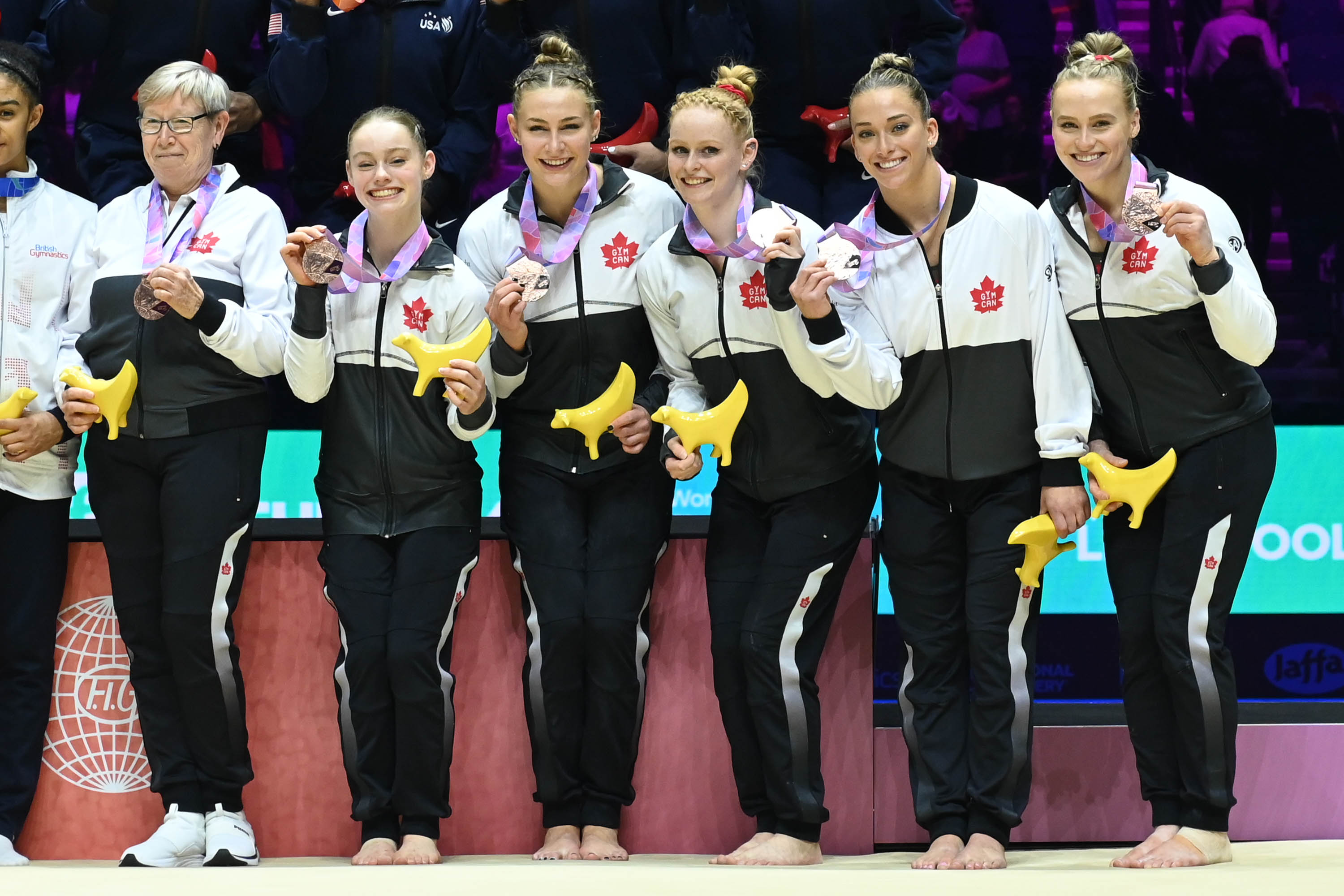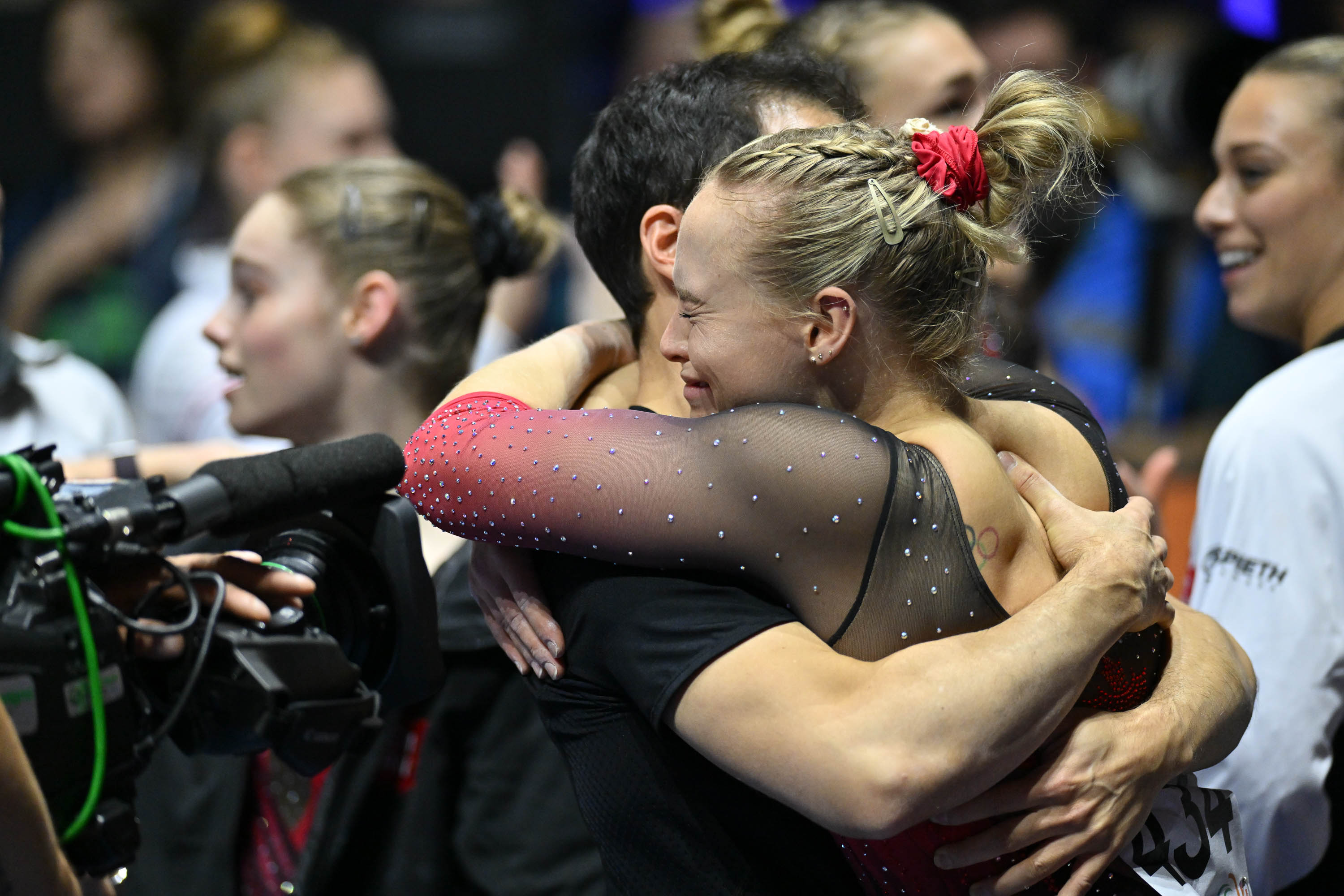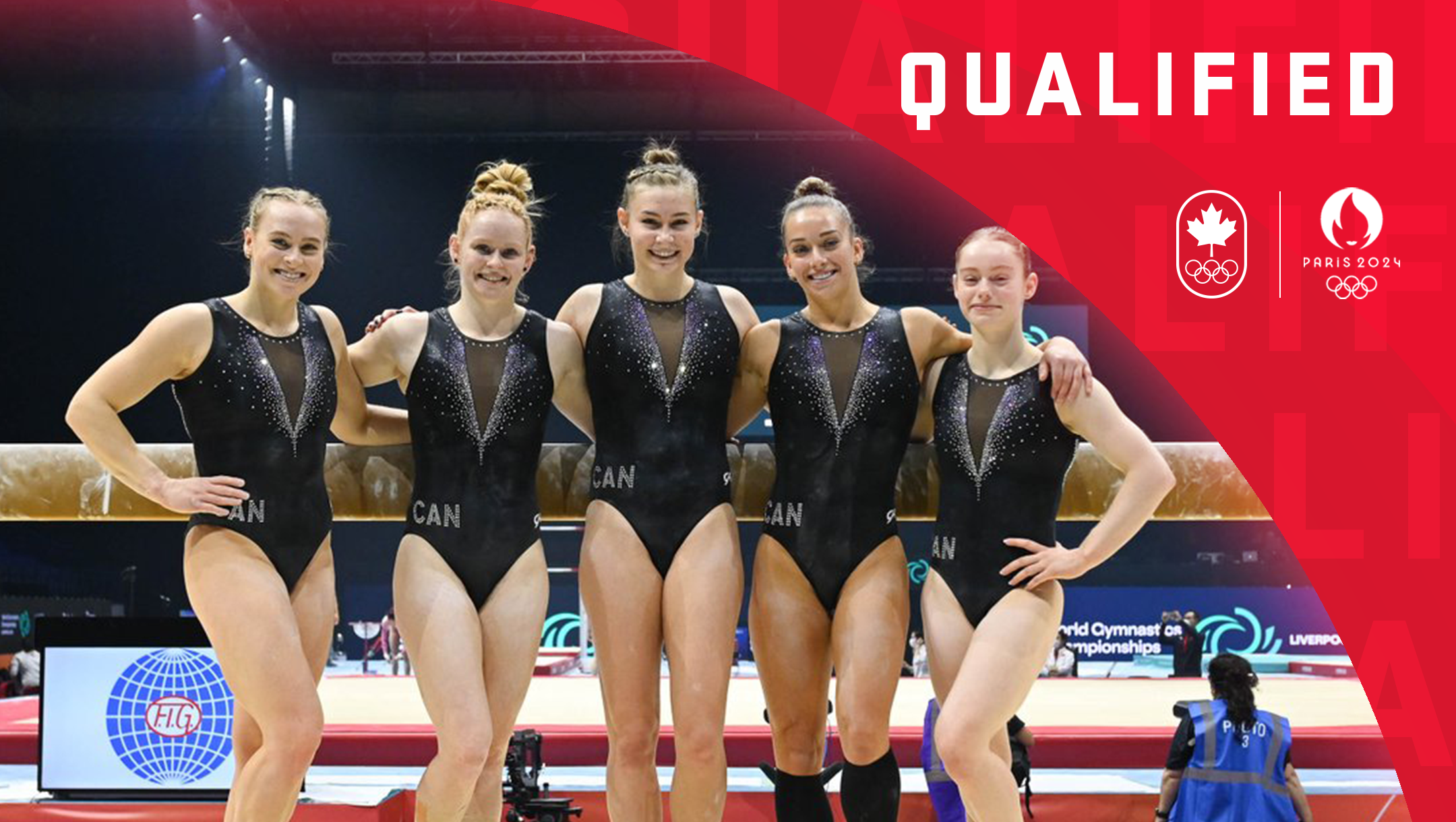Imagine pouring years, literally countless hours, into a single pursuit, pushing your physical limits and shaping your spirit with every flip, every twist, every perfectly held pose. Then, picture standing on the podium, a medal around your neck, yet feeling a deep sense of unease, a feeling that something just isn't right. That, in a way, is the quiet storm brewing when an artistic gymnastics bronze medal protest takes center stage, pulling back the curtain on the often-hidden emotional battles within this elegant sport.
This kind of moment, when an athlete decides to voice a complaint about a result, especially concerning something as cherished as a medal, truly catches everyone off guard. It’s a powerful statement, suggesting that the very essence of fair play, the careful scoring that is supposed to reflect skill and grace, might be out of balance. We see a person, who has given so much to their craft, making a very public stand, and it makes you think about all the unseen effort and sacrifice that leads to such a display of discontent, you know?
The decision to challenge a bronze medal in artistic gymnastics, a prize that many would celebrate with immense joy, speaks volumes about the athlete's conviction and their belief in what they deserve. It's more than just a score; it's about the integrity of the performance, the dedication to the sport's principles, and, honestly, the raw human emotion that bubbles up when perceived injustice takes hold. It truly is a moment that asks us to look beyond the routines and consider the human spirit involved.
Table of Contents
- What Makes Artistic Gymnastics So Special?
- Why Would an Athlete Protest a Bronze Medal?
- How Does a Protest Impact the Artistic Gymnastics World?
- What Can We Learn From an Artistic Gymnastics Bronze Medal Protest?
What Makes Artistic Gymnastics So Special?
Artistic gymnastics, as a matter of fact, stands as a unique blend of sheer physical power and expressive movement. It's a sport where athletes don't just perform feats of strength or agility; they tell a story with their bodies, creating something that is, in a way, like a living piece of art. The precision of each movement, the grace of every turn, and the sheer strength needed for those seemingly effortless displays of human capability, all come together to make it something truly captivating to watch, you know?
The Heart of Artistic Gymnastics Performance
At its core, artistic gymnastics is about the expression of imaginative ideas through physical skill. It demands a person to be sensitive to, and appreciative of, the beauty in motion. An artistic person, like a gymnast, possesses a natural leaning and a gift for making things look pleasing to the eye, even when they are pushing their bodies to the absolute brink. It’s not just about doing a flip; it’s about how that flip flows into the next movement, how the entire routine tells a tale, so to speak. This is what truly sets it apart, making each artistic gymnastics display a one-of-a-kind spectacle.
Consider the dedication involved: years upon years spent perfecting a single handstand, or maybe the way a gymnast lands with such control it seems almost impossible. This pursuit of perfection, this drive to make every element appear effortless and beautiful, is what draws so many to the sport. It's about showing real talent, about arranging movements in a beautiful way, about making something that feels like a painting or a sculpture in motion. The aesthetic quality of an artistic gymnastics routine is, quite frankly, what gives it its name and its lasting appeal.
When Artistic Expression Meets Strict Scoring
Now, here's where things get a bit tricky: this fluid, expressive art form is then subjected to a very precise scoring system. Judges watch every tiny detail, assigning points for difficulty, execution, and composition. This means that while a gymnast is trying to convey emotion and beauty, they are also trying to hit specific technical marks, which can feel like a rather stark contrast. It's a balancing act, really, between the free-flowing creative side and the cold, hard numbers that determine who wins. This tension, between the subjective feeling of art and the objective nature of a score, can sometimes lead to disagreements, which is, in some respects, where an artistic gymnastics bronze medal protest might stem from.
The rules are there to ensure fairness, of course, but the way a human eye interprets a performance can differ slightly from another. What one judge sees as a slight wobble, another might see as a momentary adjustment that doesn't take away from the overall flow. This small difference, amplified over several judges and many elements, can add up to a score that feels, to the athlete, like a misrepresentation of their performance. So, when an artistic performance is judged, there's always this underlying possibility of a difference in viewpoint, which can be quite frustrating for those involved.
Why Would an Athlete Protest a Bronze Medal?
It might seem odd, at first glance, for someone to object to a bronze medal. After all, it signifies a place among the very best in the world, a truly remarkable achievement. But for an athlete who has poured their entire being into the sport, who perhaps believes they deserved a higher spot, that bronze can feel like a bitter pill. It's not about being ungrateful for the medal itself, but rather about a deep-seated feeling that the outcome doesn't reflect the effort or the quality of their performance. This is, you know, a very human reaction to perceived injustice.
The Weight of a Bronze Medal in Artistic Gymnastics
A bronze medal in artistic gymnastics carries immense weight, far beyond its metallic composition. It represents years of early mornings, late nights, missed social events, and a relentless pursuit of physical and mental toughness. It's the culmination of dreams, the result of pushing past pain and doubt again and again. For many, it's the peak of their athletic lives. So, when an athlete reaches this pinnacle, and then feels their performance was undervalued, the emotional impact can be quite profound. It's not just about losing a spot; it's about feeling that their story, their journey, was somehow misunderstood or unfairly assessed, which can be a truly difficult thing to accept, honestly.
The difference between a bronze, silver, or gold medal can be fractions of a point, a tiny margin that separates years of dedication. This narrow gap means that every single deduction, every perceived error, is scrutinized with incredible intensity by the athlete and their team. For them, that bronze might represent a near miss, a moment where they were just on the edge of something even greater, and that closeness can make any perceived scoring error feel particularly sharp. It’s a very personal thing, this feeling of having done more than the score shows.
Perceived Unfairness Behind a Bronze Medal Protest
The core reason behind an artistic gymnastics bronze medal protest often boils down to a feeling of being treated unfairly. This isn't always about outright cheating; more often, it's about a disagreement with how the rules were applied, or how certain elements were valued by the judging panel. Athletes and their coaches spend countless hours studying the rule book, understanding exactly what earns points and what causes deductions. So, when they see a score that doesn't line up with their detailed analysis of the routine, it can spark a strong reaction, leading to a formal challenge. It's, like, a fundamental disagreement about the numbers.
This feeling of unfairness can be incredibly powerful because it touches upon the very idea of justice in competition. When an athlete gives their all, they expect a fair assessment of their performance. If that trust is broken, or seems to be broken, the desire to speak up becomes almost overwhelming. A protest, then, becomes a way to seek clarity, to ask for a re-evaluation, and to stand up for what they believe is right, not just for themselves, but perhaps for the integrity of the sport as a whole. It’s about seeking a true reflection of their hard work, and that’s a pretty understandable desire, really.
How Does a Protest Impact the Artistic Gymnastics World?
When an athlete decides to protest a medal, especially a bronze, it sends ripples throughout the entire artistic gymnastics community. It's not just about one person's score; it brings into question the judging system, the transparency of the sport, and the trust that athletes place in the officials. Such an event can shake things up quite a bit, making everyone involved take a closer look at how things are done. It can be a very uncomfortable moment for the sport, but also, potentially, a moment for growth, you know?
Shaking the Foundations of Artistic Gymnastics Events
A protest, particularly one involving a medal, can make people wonder about the fairness of artistic gymnastics events. It might lead fans to question the results they see, and it can put pressure on the governing bodies to review their procedures. This kind of public challenge can, in a way, force a re-evaluation of how judges are trained, how scores are tallied, and how disputes are handled. It’s a moment that asks the sport to reflect on its own practices and consider if there are ways to make things even more clear and just for everyone involved. It really does make you think about the underlying rules and how they are applied.
The sport relies on its reputation for fairness and integrity. If athletes feel that their efforts are not being judged correctly, it could, over time, erode confidence in the system. This means that a single protest, while focused on one result, can actually spark wider discussions about how to maintain the sport's good standing and ensure that every artistic gymnastics event is seen as truly fair. It's a bit like a wake-up call, asking everyone to pay closer attention to the details of how competition happens.
The Ripple Effect of an Artistic Gymnastics Bronze Medal Protest
The impact of an artistic gymnastics bronze medal protest extends far beyond the immediate competition. It affects the athlete involved, who must deal with the emotional aftermath of their decision, whether the protest is successful or not. It also affects their coaches, their teammates, and even other competitors who might start to look more closely at their own scores. The news of such a protest spreads quickly, reaching fans and media outlets, sparking conversations about the nature of judging and the pressures on athletes. It's a story that tends to stick around for a while, making people consider the human element of competition.
Furthermore, such a protest can influence future rule changes or procedural adjustments within the sport. If enough questions are raised, the international gymnastics federation might feel compelled to review and revise certain aspects of the scoring system or the protest process itself. So, while it starts with one athlete's disagreement over a bronze medal, it can actually lead to broader improvements that benefit everyone in artistic gymnastics down the line. It's a pretty big deal, honestly, when someone stands up like that.
What Can We Learn From an Artistic Gymnastics Bronze Medal Protest?
A protest, especially one centered on a bronze medal in artistic gymnastics, offers us a chance to learn quite a bit about the human spirit and the workings of competitive sports. It shows us the courage it takes for an athlete to stand up for what they believe in, even when it means challenging a powerful system. It also highlights the constant quest for fairness and accuracy in judging, reminding us that even in sports, there are always areas where things can be made better. It's a moment that forces us to think, you know?
Athletes Speaking Up After an Artistic Gymnastics Event
One of the clearest lessons from a protest is the importance of athletes having a voice. These individuals dedicate their lives to their sport, and their perspective on what happens during an artistic gymnastics event is incredibly valuable. When they feel compelled to speak up, it's often because they believe a fundamental principle of fair play has been overlooked. Their willingness to challenge a result, even if it means facing public scrutiny or potential backlash, speaks to their deep commitment to the integrity of their sport. It shows a kind of moral fortitude, actually, that is pretty inspiring.
It reminds us that athletes are not just performers; they are individuals with feelings, beliefs, and a profound understanding of their craft. When they voice a complaint, it's usually not done lightly. It's the result of careful thought and a strong conviction that something needs to be addressed. This act of speaking up, particularly after an artistic gymnastics competition, can serve as a powerful reminder that the human element, the athlete's own experience, should always be given serious consideration.
Moving Forward After a Bronze Medal Protest
After an artistic gymnastics bronze medal protest, the path forward involves reflection and, ideally, positive change. For the athlete, it's about processing the outcome of their challenge and deciding how to channel their energy next. For the sport's governing bodies, it's about reviewing the procedures that led to the protest and considering what adjustments might be necessary to prevent similar situations in the future. It’s about taking a moment to breathe and then figuring out the next steps, for everyone involved.
Ultimately, such events, while challenging, can lead to a stronger, more transparent sport. They push everyone to strive for greater clarity, more consistent judging, and a deeper appreciation for the immense effort and skill that goes into every artistic gymnastics performance. It’s a chance for the sport to grow, to learn from its difficult moments, and to reinforce the trust between athletes, judges, and fans. This continuous effort to improve is, in a way, what makes any sport truly enduring.
This article has explored the concept of an artistic gymnastics bronze medal protest, delving into the unique blend of art and strict scoring in gymnastics, the deep emotional reasons an athlete might challenge a medal, and the wide-ranging impact such a protest can have on the sport's integrity and its community. It also considered the valuable lessons that can be drawn from athletes speaking up and the ways the sport can move forward after such a significant event.



Detail Author:
- Name : Jerad Renner
- Username : cwuckert
- Email : bode.adeline@hotmail.com
- Birthdate : 1972-11-20
- Address : 4157 Citlalli Bypass Suite 533 West Scottieshire, SC 91677-1417
- Phone : 458.951.9423
- Company : Zboncak, Schuster and Dickens
- Job : Petroleum Engineer
- Bio : Aut officia ut fugiat est qui asperiores et fuga. Veritatis ipsa tenetur eum itaque. Nobis nihil iure quo debitis et molestiae. Magni impedit at consequuntur deserunt asperiores soluta quo incidunt.
Socials
linkedin:
- url : https://linkedin.com/in/kautzerb
- username : kautzerb
- bio : Ducimus facilis quos occaecati molestiae atque.
- followers : 1334
- following : 2882
tiktok:
- url : https://tiktok.com/@brandi_kautzer
- username : brandi_kautzer
- bio : Voluptas ut magni atque quia. A tempora in necessitatibus tenetur labore.
- followers : 1239
- following : 2536